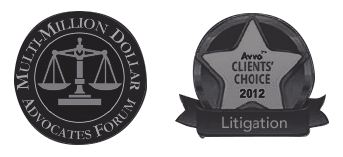THE HIGHER THE STAKES, THE GREATER THE COMPLEXITY,
THE LARGER THE POWER DISPARITY / THE STRONGER WE SHINE.
Firm News
Bochetto Argues Before Supreme Court on Novel Fee Sharing Issues
Law360, Philadelphia (September 12, 2017) — Members of Pennsylvania’s highest court questioned Tuesday whether Barrack Rodos & Bacine should be able to rely on state legal ethics rules to avoid claims from a non-attorney consultant who says the firm owes him $1.5 million in fees after reneging on a profit-sharing agreement.
Two lower courts have sided with the firm in finding that the oral contract it struck with SCF Consulting LLC was unenforceable because it violated a provision of the state’s rules of professional conduct barring lawyers from sharing fees with non-lawyers.
But members of the state’s Supreme Court raised questions during oral arguments in Philadelphia on Tuesday over whether decisions barring the claims effectively allowed Barrack Rodos to profit from engaging in unethical behavior.
“You want to say, ‘We get to keep these millions of dollars because we found this loophole,’” Justice Max Baer said.
SCF, a business entity operated by owner Scott Freda, filed suit in February 2015 accusing the firm of suddenly refusing to honor the profit-sharing agreement after a decade’s worth of service and refusing to provide compensation for work on a case that yielded a $200 million settlement.
According to his complaint, Freda had an oral agreement that called for a fixed consulting fee plus 5 percent of profits on cases he originated and 2.5 percent of profits on cases he worked on that were originated by other members of the firm.
A Philadelphia County judge tossed the suit after finding that the profit-sharing agreement was not enforceable under Rule 5.4 of the Rules of Professional Conduct, and the state’s Superior Court upheld the finding last July.
The Supreme Court agreed to hear the case in February.
George Bochetto, an attorney representing SCF, told the justices during oral arguments that courts should be required to consider whether non-lawyers were aware they were committing any ethical breaches before voiding contracts that might run afoul of legal ethics rules.
“An inquiry needs to be made of what the non-lawyer understood the circumstances to be,” he said.
He added that voiding the agreement, while ensuring compliance with one ethics rule, would essentially run roughshod over the expectation of good faith and fair dealing between attorneys and non-attorneys.
“It would allow the law firm to literally deal from the bottom of the deck,” he said.
Justice Christine Donohue, however, stressed that the purpose of the rule was ultimately to ensure that attorney-client relationships were untainted by a lawyer’s potential obligations to a financially interested third party.
“I am struggling with how this court … comes to a result that actually protects the client,” she said.
Raymond Quaglia, an attorney with Ballard Spahr LLP representing Barrack Rodos, said that the inability of non-attorney parties like SCF to enforce unethical contracts, even ones they might have entered into unknowingly, was an acceptable risk to ensure compliance with professional conduct rules.
“That’s the price the unfortunate layperson has to pay to protect the integrity of the rules,” he said.
But Chief Justice Thomas Saylor questioned whether siding with Barrack Rodos would ultimately create the impression that it was helping the firm profit off of unethical behavior.
“Wouldn’t we be lending a hand to your client?” he asked.
The court took the case under advisement.
SCF is represented by George Bochetto, Gavin Lentz and Peter Bryant of Bochetto & Lentz PC.
Barrack Rodos & Bacine is represented by Raymond Quaglia and Matthew Vahey of Ballard Spahr LLP.
The case is SCF Consulting LLC v. Barrack Rodos & Bacine, case number 7 EAP 2017, before the Pennsylvania Supreme Court.
More News
Learn more about our firm:


